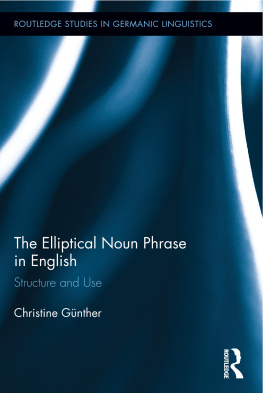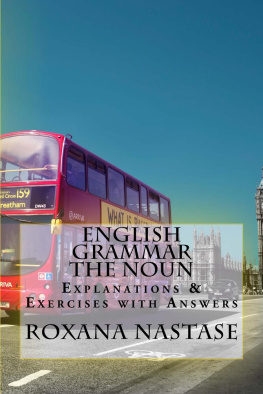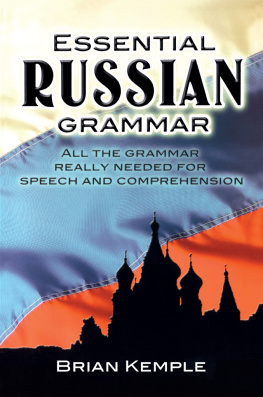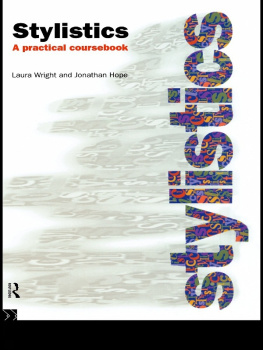The Elliptical Noun Phrase in English
This book presents a detailed analysis of structural as well as pragmatic aspects underlying the phenomenon of noun ellipsis in English. Gnther analyses the structure of elliptical noun phrases to account for the conditions on noun ellipsis and those on one -insertion, with special emphasis on the (oft-neglected) parallels between the two. She also examines the use of noun ellipsis with adjectives in order to shed light on this under-researched phenomenon, drawing on data from the British National Corpus.
Christine Gnther is a research associate at the Institut fr Deutsche Sprache in Mannheim, Germany. Holding a Ph.D. in English linguistics, she is currently working on the German language from a comparative perspective.
Routledge Studies in Germanic Linguistics
Series Editors: Ekkehard Knig, Free University Berlin, Germany Johan van der Auwera, Antwerp University, Belgium
1 Negative Contexts
Collocation, Polarity and Multiple Negation
Ton van der Wouden
2 When-Clauses and Temporal Structure
Renaat Declerck
3 The Meaning of Topic and Focus
The 59th Street Bridge Accent
Daniel Bring
4 Aspectual Grammar and Past-Time Reference
Laura A. Michaelis
5 The Grammar of Irish English
Language in Hibernian Style
Markku Filppula
6 Intensifiers in English and German
A Comparison
Peter Siemund
7 Stretched Verb Constructions in English
D.J. Allerton
8 Negation in Non-standard British English
Gaps, Regularizations and Asymmetries
Lieselotte Anderwald
9 Language Processing in Discourse
A Key to Felicitous Translation
Monika Doherty
10 Pronominal Gender in English
A Study of English Varieties from a Cross-Linguistic Perspective
Peter Siemund
11 The Grammar of Identity
Intensifiers and Reflexives in Germanic Languages
Volker Gast
12 Dislocated Elements in Discourse
Syntactic, Semantic, and Pragmatic Perspectives
Edited by Benjamin Shaer, Philippa Cook, Werner Frey, and Claudia Maienborn
13 English and Celtic in Contact
Markku Filppula, Juhani Klemola, and Heli Paulasto
14 Vernacular Universals and Language Contacts
Evidence from Varieties of English and Beyond
Edited by Markku Filppula, Juhani Klemola, and Heli Paulasto
15 Reciprocity in English
Historical Development and Synchronic Structure
Florian Haas
16 The Elliptical Noun Phrase in English
Structure and Use
Christine Gnther
The Elliptical Noun Phrase in English
Structure and Use
Christine Gnther
First published 2013
by Routledge
711 Third Avenue, New York, NY 10017
Simultaneously published in the UK
by Routledge
2 Park Square, Milton Park, Abingdon, Oxon OX14 4RN
Routledge is an imprint of the Taylor & Francis Group, an informa business
2013 Taylor & Francis
The right of Christine Gnther to be identified as author of this work has been asserted by him/her in accordance with sections 77 and 78 of the Copyright, Designs and Patents Act 1988.
All rights reserved. No part of this book may be reprinted or reproduced or utilised in any form or by any electronic, mechanical, or other means, now known or hereafter invented, including photocopying and recording, or in any information storage or retrieval system, without permission in writing from the publishers.
Trademark Notice: Product or corporate names may be trademarks or registered trademarks, and are used only for identification and explanation without intent to infringe.
Library of Congress Cataloging-in-Publication Data
Gnther, Christine, 1981
The elliptical noun phrase in English: structure and use / by Christine Gunther.
p. cm. (Routledge Studies in Germanic Linguistics; 16)
Includes bibliographical references and index.
1. Grammar, Comparative and generalEllipsis. 2. English language Noun phrase. 3. German languageNoun phrase. 4. Comparison (Grammar) 5. German languageGrammar, ComparativeEnglish. 6. English languageGrammar, ComparativeGerman. 7. Comparison (Grammar) 8. Grammar, Comparative and generalSyntax. I. Title.
P291.3.G86 2012
425'.5dc23
2012025377
ISBN: 978-0-415-65826-3 (hb)
ISBN: 978-0-203-07619-4 (ebk)
Typeset in Sabon
by Apex CoVantage, LLC
For my parents and my sister
Contents
This study is based on my doctoral dissertation, defended at the University of Osnabrck in 2011. I owe thanks to three anonymous reviewers for helpful comments that contributed significantly to the revision of the original material.
These acknowledgments certainly cannot do justice to all the people who have supported me in one way or another, accompanying me through several stages of my work, but I will try to address as many of them as possible.
The interest in the English noun phrase was initiated in my second year as an undergraduate student at the University of Dsseldorf, when I took a class given by Anette Rosenbach, which had a considerable share in my decision to focus on linguistics in general and the nominal domain in particular. I am very grateful to Anette for her inspiration and constant support. I am also thankful to Dieter Stein and the (former) staff of the Department of English Language and Linguistics at the University of Dsseldorf for my pleasant and inspiring time as a student assistant.
When I took up my dissertation project, I soon realized that I needed a reliable set of data. My supervisor, Alexander Bergs, and my colleague Lena Heine suggested using corpora to clarify the matter. Up to that point, I was admittedly skeptical of that method, and, at first glance, my doubts were confirmedI spent weeks working through thousands of examples to pick out the ones that met my definition of noun ellipsis. But I revised my attitude toward corpora because they gave me a profound set of data I would not have received otherwise. I am thankful to both Alex and Lena for this suggestion and their support throughout my time at the English Department of the University of Osnabrck. I also owe thanks to my colleagues Verena Barbosa Duarte and Meike Pfaff for enduring (and enjoying) the ups and downs of being PhD students together, and to Verena and Mina and Nicky Vollstedt for providing shelter.
I am also indebted to the many colleagues who made helpful suggestions at various conferences (NP 1 and 2, ICLCE 3 and 4, ISLE 2)there are simply too many to name here. Special thanks goes to Gisela Zifonun and my colleagues at Institut fr Deutsche Sprache in the Grammatik des Deutschen im Europischen Vergleich project. The cooperation within this
project contributed enormously to the present form of the study. Furthermore, I would like to thank Carola Trips and the staff at the Department for Diachronic English Linguistics for inspiring discussions and for making sure I do not lose touch with English linguistics.
This book would not have been possible without Dennis Ott, who never tired of answering my questions and of discussing the same aspects over and over again. I am deeply indebted to Dennis for his support, his friendship, and his belief in me.
Last, but not least, I would like to express my gratitude to my parents, Sabine and Horst Gnther, my sister, Julia Gnther, as well as my friends Nina Delvos, Susanne Erhardt, Svenja Knig, Uta Koppert-Maats, Zoe Karastogianni, Steffie Mehlem, and Anna Volodina for support in every possible way.











